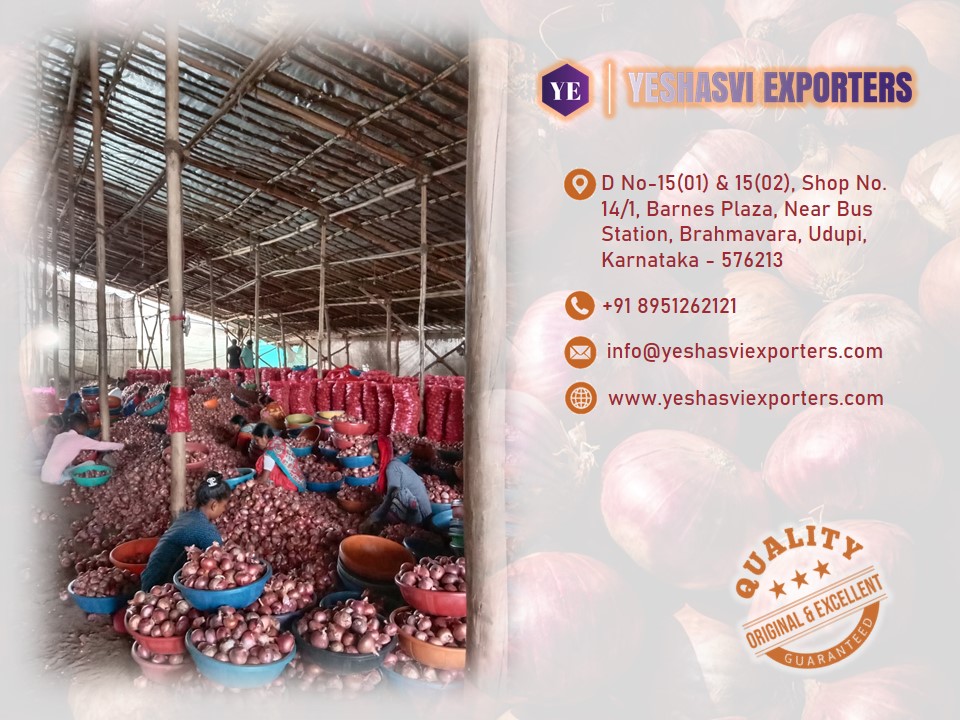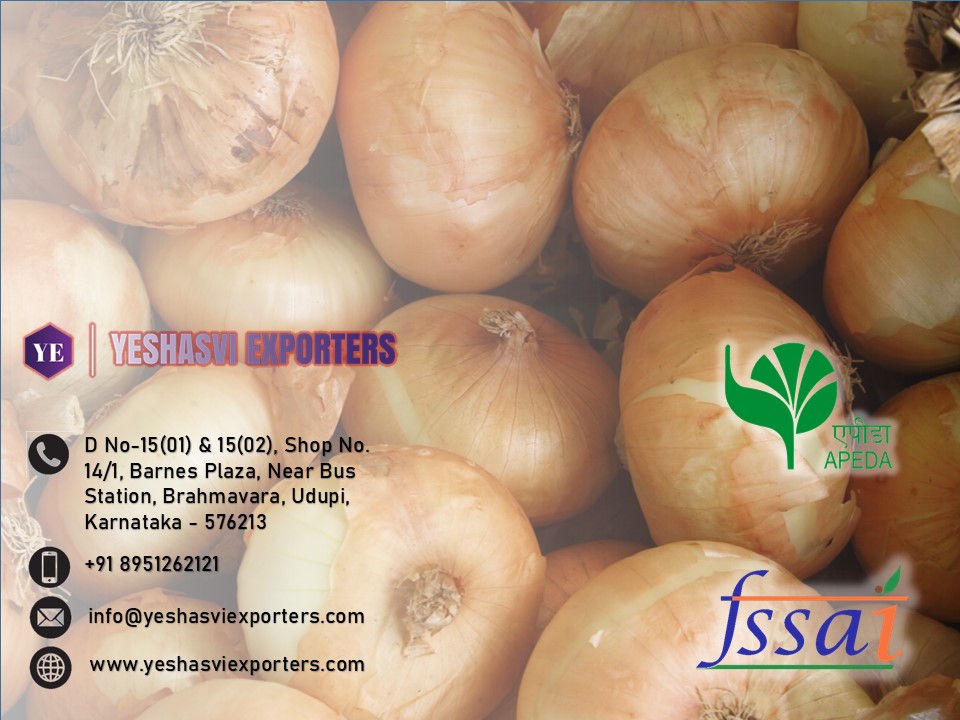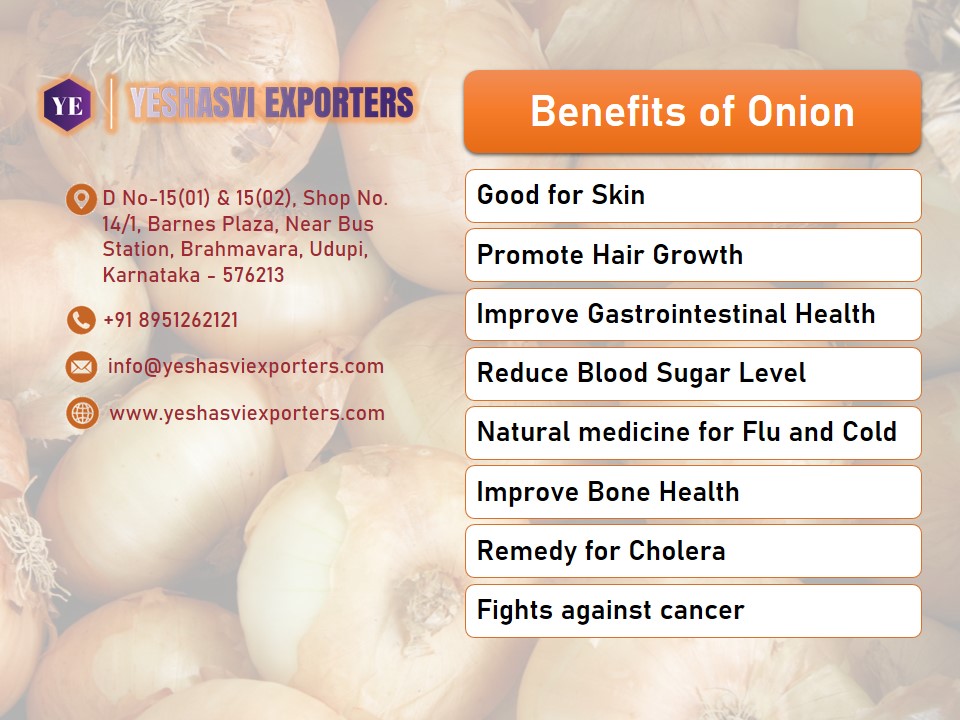Onion:
In the same family as garlic, shallots, leeks, and chives is the bulbous vegetable known as the onion. Onions are a common element in many cuisines around the world and are used extensively in cooking due to their distinctive flavor and scent.

It depends on the kind, but onions can have a spicy, sweet, or mild flavor. They come in a range of colors, including yellow or brown onions, red onions, and white onions. They can be either raw or cooked and are often used in a variety of cuisines, including soups, stews, sauces, stir-fries, salads, and more.Onions are used in food preparation and are thought to have certain health advantages. They have been linked to health benefits due to their high antioxidant, vitamin, and mineral content offers a range of health advantages, such as anti-inflammatory, anti-cancer, and heart health qualities.
In general, onions are kept out of direct sunlight in a cold, dry, and well-ventilated environment. Depending on the intended usage, they can be obtained in a variety of forms, including whole bulbs, pre-chopped, minced, or onion powder. Onions are frequently peeled and the papery outer layers are removed before cutting or boiling when they are used in recipes.

How many onion seeds per hole?
Depending on the variety of onions and the needed spacing, a certain quantity of onion seeds should be placed in each hole. Onion seeds, however, are often seeded at 2-3 seeds per hole as a general rule of thumb.
This gives enough seedlings to guarantee a strong stand even in the event that some seeds do not germinate or fail to establish. It's crucial to avoid spreading too many onion seeds per hole because their small size can lead to poor growth and smaller bulb size.
Additionally, depending on the suggested spacing for the particular onion variety you are planting, the distance between the holes or rows will also vary. It's crucial to adhere to the instructions on the seed packet or seedling transplant depending on the cultivar, climate, and growing circumstances, spacing may change. When onions are spaced appropriately, there is enough area for the onion bulbs to grow properly and for air to circulate, light to penetrate, and both.
How effective onion is for health and for cooking food:
A tasty and adaptable vegetable, onions may improve the taste and nutritional value of many recipes. The following are some applications for onions that benefit both food and health:
Flavor: Onions are frequently utilized in many different cuisines all over the world to increase aroma. They give food a savory, somewhat sweet, and slightly pungent flavor that can help foods taste better by balancing other flavors’.
Versatility: There are many different methods to prepare onions, such as sautéing, caramelizing, roasting, grilling, and frying. Soups, stews, curries, stir-fries, salads, and sandwiches are just a few of the many meals you may use them in.
Nutritional value: Onions are an excellent source of vitamin C, vitamin B6, and other vitamins and minerals. , potassium, and folate. Additionally, they contain a lot of antioxidants, which can help shield cells from the harm that free radicals can do.
Benefits for health: Onions contain substances with anti-inflammatory, antioxidant, and anti-cancer effects, such as quercetin and sulphur compounds. Regular onion eating may help to lower inflammation, improve immunity, control blood sugar, and lower the chance of developing several malignancies.
Digestive health: The fiber insulin, which is found in onions, helps enhance digestive health by encouraging the development of good gut bacteria. Additionally, insulin can aid in controlling bowel movements and avoiding constipation.
In conclusion, onions are a tasty and adaptable vegetable that may improve the flavor and nutritional content of a variety of recipes.

Importing onion from India best for you!
Businesses that deal with the import and sale of onions may benefit in a number of ways from importing onions from India to the other countries like UK, US all European and Gulf countries. Here are a few of the main advantages:
Large production capacity: India is one of the world's top producers of onions, and it has the ability to supply both home and international demand. This implies that an organization that imports onions from India may have a steady supply of onions all year round.
Pricing that is competitive: India is renowned for producing high-quality onions at rates that are competitive. A company may retain its profit margins and keep its product pricing competitive by importing onions from India.
Year-round availability: Since onions are cultivated all year round in India, a company that imports Indian onions can provide a steady supply of onions all year long. This can assist in supplying onions even when they are not readily accessible elsewhere in the world due to the off-season.
Variety of onion types: Red, white, and yellow onions are among the many onion kinds that are produced in India. A company importing onions from India may take advantage of this variety and provide a wide selection of onion types to its clients.
High standards: To guarantee the quality and safety of onions produced in India, the Indian government has put strong laws and standards in place. A company may feel confident in the quality of the goods they are purchasing by importing onions from India.
In conclusion, buying onions from India and shipping them to other countries can be a cost-effective approach to get high-quality onions all year long, diversify the supply chain, and take advantage of the variety of onions produced in India. Additionally, it can assist a company in keeping up its profit margins and giving customers affordable prices.